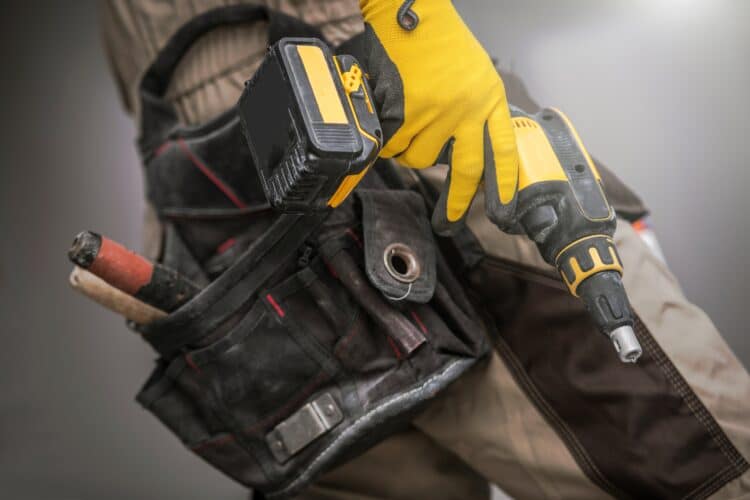What’s the Difference Between Ryobi 2Ah and 4Ah Batteries?
Key Takeaways
- The 2Ah battery has a lower capacity and shorter runtime, making it more suitable for lighter tasks and occasional use.
- The 4Ah battery has a higher capacity and longer runtime, making it ideal for heavy-duty applications and projects that require sustained power over a longer period of time.
- The 2Ah battery is smaller, more compact, and lighter, making it more portable and convenient for lighter tasks, while the 4Ah battery provides more power but is larger and heavier.
When it comes to cordless power tools, having the right battery can make all the difference. Ryobi offers a range of batteries for their devices, including 2Ah and 4Ah options. But what exactly is the difference between these batteries? In this article, we will explore the distinctions between the Ryobi 2Ah and 4Ah batteries, examining their capacity, power output, size, price, and overall performance.
Battery Capacity and Runtime
The most significant difference between the Ryobi 2Ah and 4Ah batteries lies in their capacity and runtime. The 2Ah battery has a lower capacity, meaning it can store less energy compared to the 4Ah battery. As a result, the 2Ah battery provides a shorter runtime, making it more suitable for lighter tasks and occasional use.
On the other hand, the 4Ah battery boasts a higher capacity that allows it to last twice as long as the 2Ah battery. This extended runtime makes it ideal for heavy-duty applications and projects that require sustained power over a longer period of time.
Power Output
In terms of power output, the 4Ah battery has the advantage. It can deliver more power to the tool, making it better suited for demanding tasks that require increased performance. The 2Ah battery, with its lower power output, may struggle to handle heavy-duty applications and may be better suited for lighter tasks.
Size and Weight
When it comes to size and weight, the 2Ah battery is the winner. It is smaller, more compact, and lighter compared to the 4Ah battery. This makes the 2Ah battery more portable and easier to handle, especially in remote locations or when working on ladders. The 4Ah battery, while providing more power, is larger and heavier, making it less convenient to carry around.
Price
Price is also a factor to consider when choosing between the Ryobi 2Ah and 4Ah batteries. Generally, the 4Ah battery has a higher price compared to the 2Ah battery. This is due to its larger capacity and increased power output. However, it’s important to weigh the cost against the intended use. If you require more power and longer runtime, the 4Ah battery may provide better value for money in demanding applications.
Compatibility and Charging
Both the Ryobi 2Ah and 4Ah batteries are compatible with a wide range of Ryobi devices. They can be used interchangeably in the same cordless power tools, allowing for flexibility and convenience. Additionally, both batteries can be charged relatively quickly, minimizing downtime and ensuring you can get back to work efficiently.
Durability and User Reviews
When it comes to durability, both the Ryobi 2Ah and 4Ah batteries are designed to withstand various environmental conditions. They are built to be rugged and reliable, ensuring consistent performance even in challenging situations. While the user reviews are not mentioned in the provided information, Ryobi batteries, in general, have a good reputation for reliability and longevity.
Conclusion
In conclusion, the Ryobi 2Ah and 4Ah batteries have distinct differences that make them suitable for different purposes. The 2Ah battery is smaller, more compact, and lighter, making it more portable and convenient for lighter tasks. It is also more affordable, making it a good choice for occasional use.
On the other hand, the 4Ah battery offers a higher capacity, longer runtime, and increased power output. It is better suited for heavy-duty applications and projects that require sustained power over an extended period of time. While it may be larger, heavier, and more expensive, it provides better value for money in demanding applications.
Related Websites:
FAQs:
Q: What is the difference between Ryobi 2Ah and 4Ah batteries?
Ryobi 2Ah and 4Ah batteries differ in their Amp-Hour (Ah) rating, which measures battery capacity. Higher Ah ratings generally provide longer runtimes. A 2Ah battery is suitable for light to medium-duty tasks and offers a moderate runtime. On the other hand, a 4Ah battery provides a longer runtime compared to the 2Ah variant. The choice between the two depends on specific requirements, including desired runtime, task nature, and user comfort.
Q: What is Amp-Hour (Ah) rating?
Amp-Hour (Ah) rating is a measure of a battery’s capacity. It indicates the amount of current a battery can provide over a specific period. Higher Ah ratings generally mean longer runtimes, as the battery holds more charge.
Q: What are the advantages and limitations of using Ryobi 2Ah batteries?
Ryobi 2Ah batteries offer a moderate runtime suitable for light to medium-duty tasks. They are often lighter and more compact, improving tool ergonomics. However, their capacity may not be sufficient for prolonged use or heavy-duty applications, requiring more frequent recharging or battery swaps.
Q: What are the benefits and considerations of utilizing Ryobi 4Ah batteries?
Ryobi 4Ah batteries provide a longer runtime compared to the 2Ah variant, making them ideal for extended or heavy-duty tasks. They offer more power before requiring recharging or battery swaps. However, higher Ah batteries may be bulkier and heavier, potentially impacting the tool’s overall ergonomics and user comfort.
Q: How do I choose between Ryobi 2Ah and 4Ah batteries?
Choosing between Ryobi 2Ah and 4Ah batteries depends on various factors. Consider the nature of the project or task, desired runtime, and your comfort and preference. If you need longer runtimes or plan to tackle heavy-duty tasks, a 4Ah battery may be more suitable. However, if you prioritize lightweight and compact tools or have lighter tasks, a 2Ah battery can suffice. Assess your needs and consult product specifications to make an informed decision.





